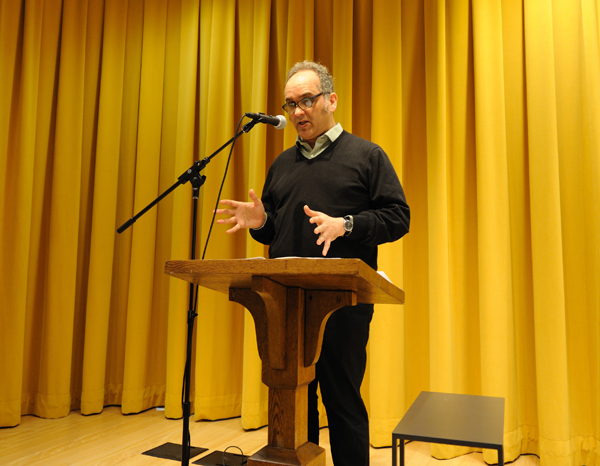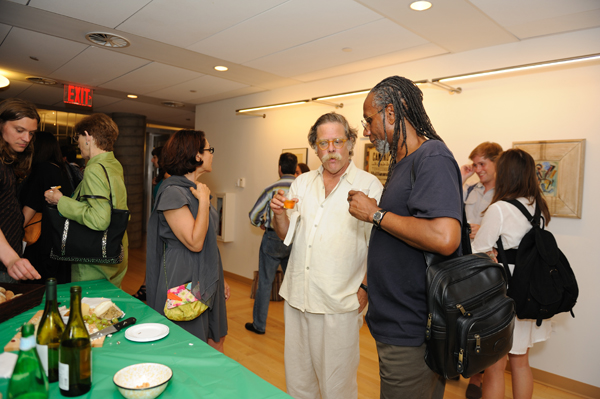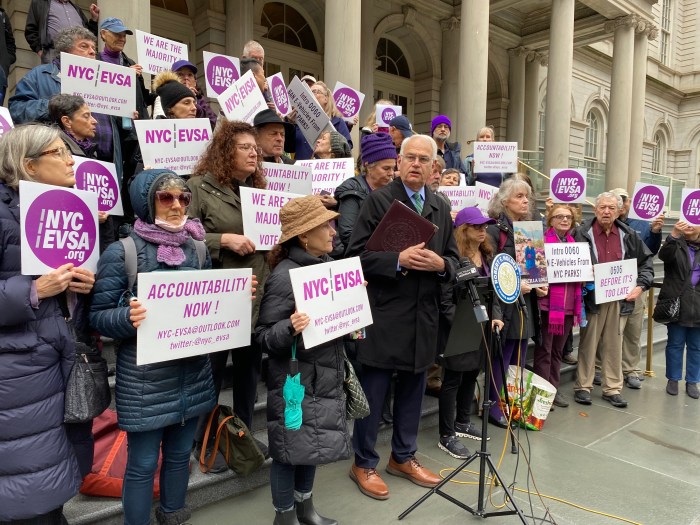 [/media-credit]
[/media-credit]
- Poet K. Silem Mohammad spoke about William Wordsworth and Samuel Taylor Coleridge as part of Poets House’s 25th anniversary celebration that includes noted poets and scholars discussing the history of poetry from Gilgamesh to the present.
BY TERESE LOEB KREUZER | Sheldon Pollock, a professor at Columbia University and an expert on Sanskrit poetry, stood in front of a packed room at Poets House in Battery Park City.
“I have technically three thousand years of poetry to tell you about this evening in less than an hour,” he said before launching into an explanation, complete with recordings, of how Sanskrit poetry had evolved from the Vedas, whose earliest parts date from around 1500 B.C.
And Poets House, celebrating the 25th year since it opened to the public with a core collection of 600 books of poetry, will have had 10 months between September 2011 and June 2012 to trace the history of poetry beginning with the epic “Gilgamesh” from ancient Mesopotamia and ending in the near-present.
“We started out thinking we would do 25 programs in honor of the 25th anniversary,” said Stephen Motika, Poets House’s programming director, “but we will have done 36 programs by the time we finish.”
The lectures have been presented by top scholars and illustrious poets, with another 16 programs still to come before the series ends on June 8.

Among the presenters, Paula Varsano, scholar, translator and a professor in the Department of East Asian Languages and Cultures at the University of California, Berkeley, came east to talk about ancient Chinese poetry, its structures and nuances and the difficulties of translating it into English (“Chinese poetry doesn’t have tenses,” she said.)
Robert Hollander, professor in European Literature Emeritus in the Department of French and Italian at Princeton University, talked about Dante, whose “Divine Comedy” he and wife, Jean, have translated into English. (“Who is the nameless hero of this poem,” Robert asked after he had recited the first 18 lines of “The Inferno” in Italian, and Jean had read them in English. “We will find out in Purgatory 3, line 55.”)
There were lectures on Petrarch, Chaucer, Marlowe and Shakespeare. Coleman Barks talked about Rumi, the 13th century Persian poet and mystic whose writing Barks has rendered into evocative and accessible English, making Rumi one of the best-loved poets in the English-speaking world. “Out beyond ideas of wrongdoing and rightdoing, there is a field. I’ll meet you there,” Barks recited from one of his Rumi translations. Then, he said in his folksy, self-deprecating and deceptively simple way, “I think in the original, it’s an orchard or a garden. But don’t you just love the world ‘field?’ I’m just telling you, I mistranslate” — alluding to a sin for which he has been reprimanded by some scholars, but which his wide audience freely forgives.
Poet and professor K. Silem Mohammad discussed Wordsworth and Coleridge, and their “Lyrical Ballads,” first published in 1798, which he said were “strange to contemporary readers. They heralded the arrival of modern poetics,” he said, “but they are based on models from the past.” He quoted Wordsworth’s belief that “poetry can be found in every subject that interests the human mind” and not just in heroic subjects with “padded diction.”
A panel of poets and scholars (Judith Harris, Stanley Plumly and Anne Wright) discussed the short, brimful life of John Keats.
Still to come in the anniversary series are lectures on William Butler Yeats, 19th-century French poetry, a Gertrude Stein celebration, Robert Frost, Lola Ridge, Wallace Stevens, William Carlos Williams, the Imagists (Ezra Pound and H.D.), the Objectivists, the Harlem Renaissance, W.H. Auden, the Caribbean poets of the 20th century, Puerto Rican poetry, the Black Mountain poets, John Berryman, Elizabeth Bishop and Robert Lowell, and the Beats.
“People have loved the lectures,” said Motika. “They can see how everything fits together.”
Each lecture costs $10, or $7 for students and seniors. All programs are free to Poets House members. Membership in Poets House starts at $40 a year for individuals.
Poets House was founded in 1985 by poet Stanley Kunitz and arts administrator Elizabeth (Betty) Kray. It now has a 50,000-volume library that is housed at 10 River Terrace in Battery Park City. It is open free from Tuesdays to Saturdays. For more information about Poets House and its programming, go to www.poetshouse.org



































